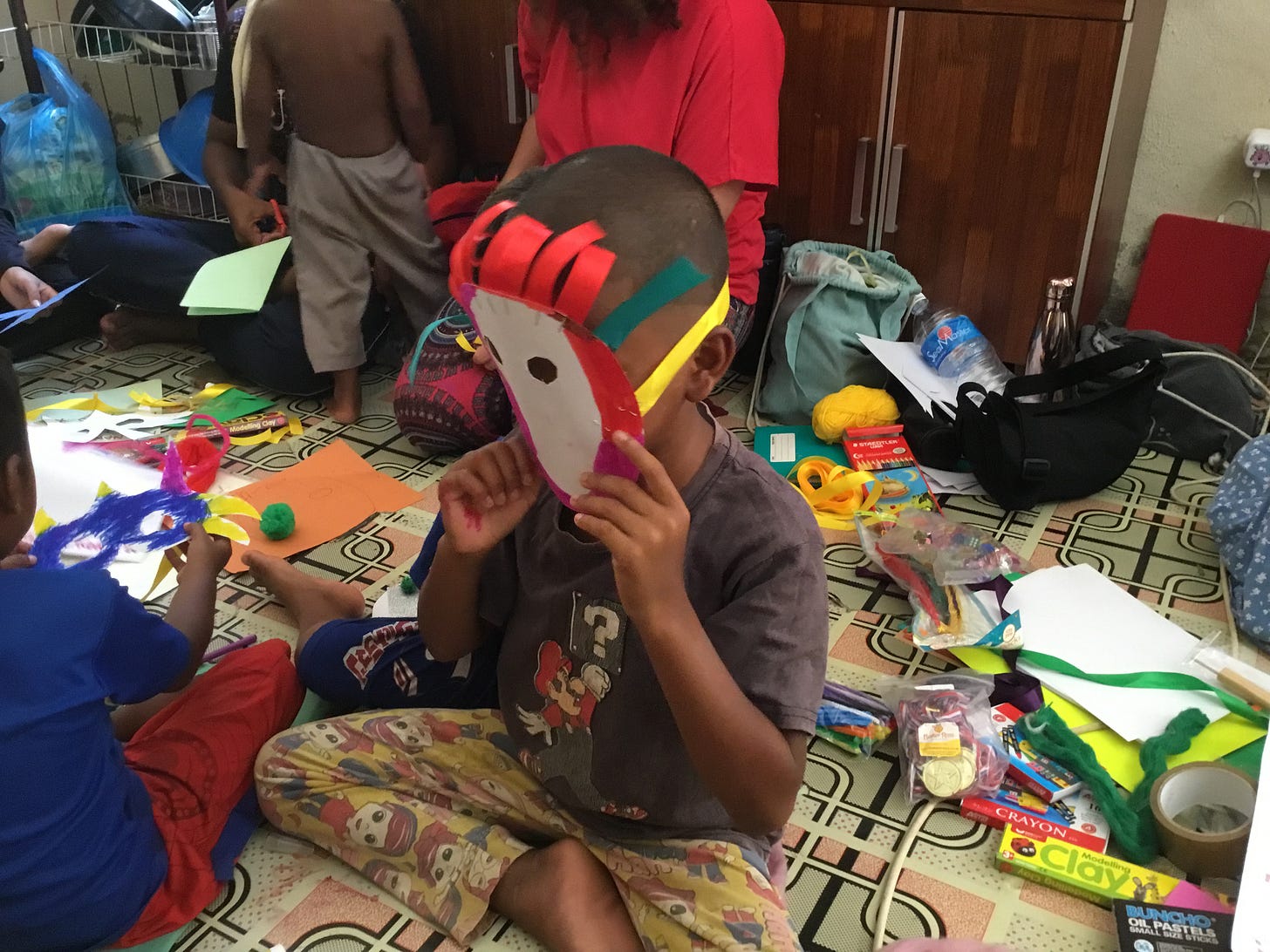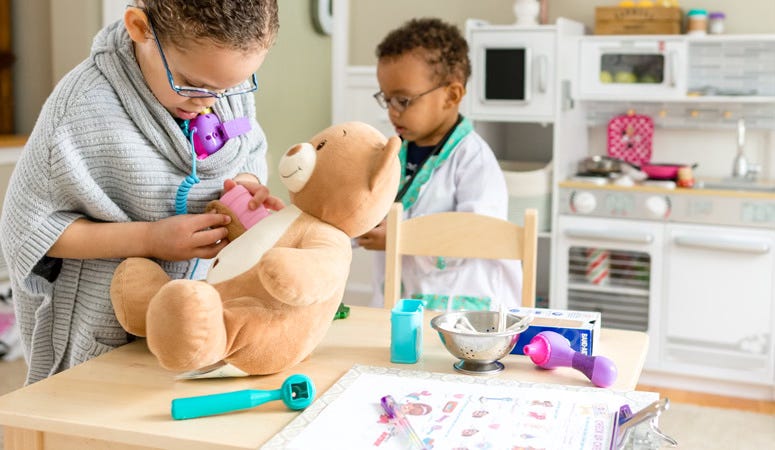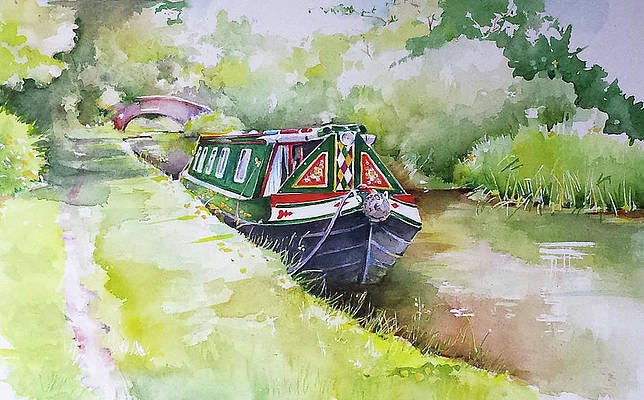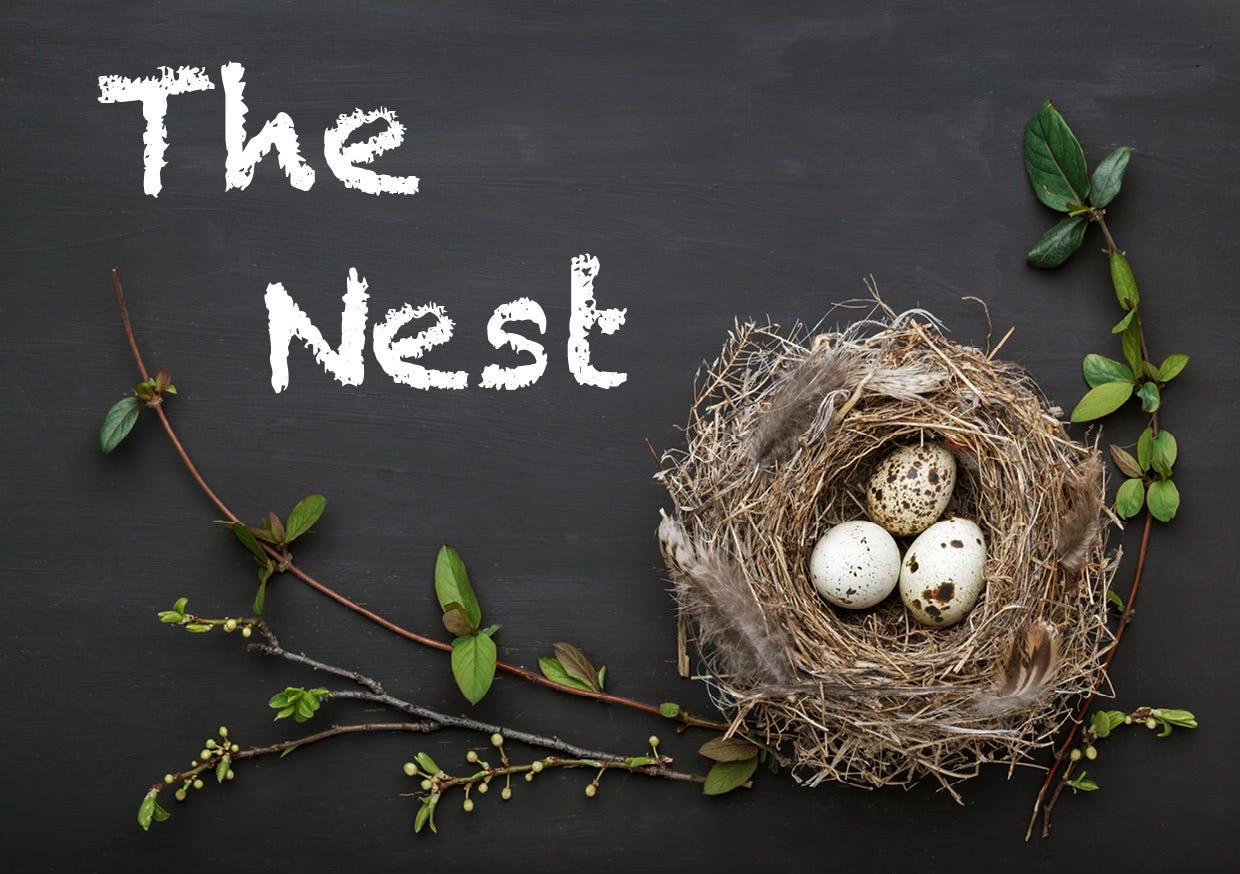Leaving the Jungle
It was hard leaving the Temiar villages and the many people who had looked after us. Goodbyes and greetings are very low key, not wanting to draw any attention to Tiger or Thunder. Nevertheless a large group of the children took a short cut through the forest and were waiting for us by one of the fragile bridges that spanned the river. Lots of hugs and kisses, and Johnnie and a friend were escorting us on their motor bikes until we reached a proper road. We were finally leaving the jungle, maybe a bit grubby and with clothes that needed hot washes, but so many memories: dancing and singing, water play in the river, trekking and raft building and navigating, together with artefacts of head-dresses, mats, purses, and of course lots of photographs.
We stopped for a Malay rural lunch on the way, in a large open-sided room, where we had the fresh air but were protected from the scorching sun. As always, it was a family-run business with children helping out when service was needed. Children would also help out with translation. Often there would be four generations there, the older people watching or barking out an instruction, and young mothers with their new-born babies, breast-feeding and rocking.
Our half-way stop was a town called Raub and we stayed at the Hotel Jelai and, YES, it had a laundry service! Raub is very interesting place being the oldest town in the state of Pahang. Originally it was the site of intensive gold-mining, and the word raub means handful or scoop; alluding to the plentiful gold discovered when just a handful of earth was scooped up. There are many beautiful sites in Raub, including gardens and waterfalls, which sadly we could only minimally visit.
We needed to get back to Kuala Lumpur for our final assessments and awards, site seeing and planes to catch. What a surprise when. we arrived at our hotel that was like a space station! More about that next time.
With Love,
Dr Sue
June 2024
Please watch this video made by Andy Hickson to give a flavour of our trip - and thanks to Andy for all his organisational work, workshops, driving, translation, as well as photography!
NDP and Forms of Play
We have discussed the basics of NDP in previous Newsletters, namely: Water Play, Rhythmic Play, Messy Play and Dramatic Play. Although water play probably starts it all off, these contrasting play-forms start and interact with each other, rather than following a developmental pathway.
“Rhythmic play usually gives safety and security, and messy play is the adventure for the curious!” (Jennings, 2024)
There in the background is the steady heartbeat, slowing down at night, speeding up again. Alerting us to danger when it beats really fast, calming us down when it slows to gentle rhythm, influenced by our breathing. One reason that bubble blowing can be helpful during any fear episodes, is that you need a deep, slow breath to make the bubbles happen.
Rhythmic Play: so we are calm with our heartbeats, and we are rocked in arms or cradles:
Dramatic Play: also known as Interactive Play; we can observe the rehearsal for this during pregnancy when mothers talk to their unborn child, and then answer themselves as if they are the child. The bed-rock of the Stanislavsky theory regarding the actor’s process is ‘as if’. You are portraying this character as if you are the character. NDP theory is clear that this process of ‘taking the role of the other’ is role modelled during pregnancy and the first few years of life. We are all familiar with the child talking to Teddy or the cat or an imaginary friend and then answering themselves as the toy or pet or friend.
Three sisters who lived on a farm had an imaginary friend who lived in the woods. She was called ‘Mrs Boxing Day’ and she kept animals instead of having children. The sisters would go regularly to play with her until they were into their early teens, and had started secondary school. The stories they told about her were reminiscent of Hansel and Gretal, save that the woman in the woods was a positive and not a malign influence. There were some family challenges when the girls would use Mrs Boxing Day to justify things they wanted to do or not do! For example ‘Mrs Boxing Day says it’s OK to go to bed later,’ or ‘We always have two puddings at her house,’ or ‘She really liked my pink slides!’
I think we need to be aware that dramatic play is very important for developing empathy, a quality that is sadly decreasing, in increasingly younger children, according to teachers. To be able to feel ‘as the other’ is how we develop empathy, and role reversing is one way into the empathic experience.
Perhaps we all need a Mrs Boxing Day?
Bits and Pieces
- NDP Short Course: Messy Play for All
We still have a few places left on this course. Please click on the button below for more information or to book. Paid subscribers: don’t forget that you’re entitled to a free place on this course. Just email us at admin@ndpltd.org
- Supervision Group Vacancies
Please note that I have a small number of vacancies in my monthly, online Supervision groups. See below:
- NDP Live Diploma: Autumn Semester
Applications are open for the Autumn Semester of our Live Online NDP Diploma:
- Self-Guided Diploma
Our Self-Guided NDP Diploma is ready! You may have already applied; in which case you will hear from us shortly. Otherwise apply now in order to be able to study at your own pace and in your own time!
And finally, our bed-time story, this time it is more about life at a rural school after WW2.
Miss Penny-Weather’s Country School
The next part of The Story of Jimmy Swift, the Boy from Somerset:
Miss Penny-Weather’s Country School story is based on events that the author experienced or that she heard about as a child in post-war Britain. It creates the atmosphere of the rural school and is a useful addition to lessons about social history. It will be published as a book later this year
Miss Penny-Weather went back into school, a little puzzled about this new boy and his sudden disappearance. The children were working quietly at their pictures and colouring their names. She asked the class, ‘Has anyone met the new boy, Jimmy Swift before? I am wondering how to get in touch with him.’ The class chorused ‘No, Miss.’ But she noticed that Sheila Jones was turning red and trying to hide behind the boy sitting in front of her, Freddie Stretton. The teacher looked inquiringly towards her, and Sheila surreptitiously shook her head, and bent her head forward and continued colouring.
Miss Penny-Weather glanced at her watch and said to the class, ‘It’s break and milk time.’ The two milk monitors for today, Janet and Jack, went to fetch the crates of small milk bottles and the boxes of straws. They placed them on the table at the back of the class, and the children made two lines, one to each crate to take their bottle and straw. On a nice day they were allowed to drink it in the playground, providing nobody ran with a glass bottle! As the children wandered outside, Sheila Smith went up to the teacher’s desk, looking hugely embarrassed, and she tried to say something, but was struggling. Miss Penny-Weather looked up and said to her, ‘I think you are having to keep a secret.’
Sheila said, ‘Yes Miss, I’m not supposed to talk about it.’ She looked upset and so the teacher wasn’t going to press her but said, ‘I’m not trying to make you tell me something you are not supposed to, but I’m worried that Jimmy should be in school, and I don’t know how to get in touch with him or his family.’ Sheila looked relieved, ‘So, he is not going to get in to trouble then?’ ‘No, not at all,’ answered Miss Penny-Weather. ‘That’s OK then. He’s my cousin, but my family don’t speak to his family because they are...’ she paused, looking embarrassed. ‘Gypsies?’ said the teacher. ‘Nah,’ said the girl. ‘Bargees. They live on the boats and go up and down the canal.’
The teacher smiled at the child and said, ‘Don’t worry about anything. I will keep your secret but I will find my own way to get in touch with Jimmy.’ ‘I can help you with that, Miss. Their barge always passes here on Mondays and Thursdays, one way to deliver and one way to fetch.’
‘Now, don’t worry Sheila, I will find my own way of getting in contact, and your name won’t come into it. Now run off to play.’ Sheila looked very relieved, took a bottle of milk and a straw, and joined her friends in the playground. Meanwhile, Miss Penny-Weather wrote herself a few notes. A plan was forming in her mind!
Paid subscribers can find related reflections activities for this story below in the subscribers’ section.
If you prefer to listen to these stories, they will shortly be available on the YouTube channel ‘NDP Storytime with Sue Jennings’.
A Special Offer for my readers!
We’re delighted to be able to offer a 10% discount off the RRP of this wonderful new book, written by our friend and colleague Dr Clive Holmwood. It will certainly be an invaluable resource for everyone! Please see the details below:
Welcome to our Subscribers’ exclusive area with more news items, resources, stories and more. If you can’t see the below then please do subscribe and join us!
Keep reading with a 7-day free trial
Subscribe to Sue Jennings Presents to keep reading this post and get 7 days of free access to the full post archives.














